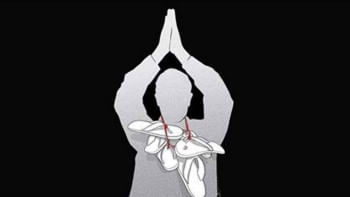The fault in our star-gazing: Do we care about teachers?

There are two versions of this story. One describes the merciless beating of a college principal by a member of parliament allegedly because the teacher failed to prevent his colleagues from slandering a senior politician's wife. The second version shows the same principal sitting next to his alleged beater to claim "all'z well." Apparently, the MP tried to stop a brawl in which the principal likely hurt himself. The "misunderstanding" is water under the Padma Bridge now.
Then comes a random warning: The government is closely monitoring social media for teachers fishing in the murky water. Why specify teachers with the not-so-subtle hint of a threat? Aren't we all being watched? Are teachers banned from expressing their opinions? How will they teach, then? Simply by repeating the text?
Recent incidents of humiliation and persecution of teachers confirm such suspicions. One teacher was beaten to death for "insulting" a student before his girlfriend. Some were forced to wear garlands of shoes or made to squat while holding their ears to remind them of their "true" positions in the institutions, run by not "tender" students but by tender politics. With so much going on, Mr MP perhaps chose the wrong time to teach the principal of his constituency "a lesson." The administrative warning shows how seriously the government is gauging the situation.
If a country fails to protect its scholars and teachers, they will be forced to either leave their jobs, change professions, or move abroad. Nobody wants to relive Satyajit Ray's political satire "Hirak Rajar Deshe," where the idealist school teacher Udayan Pandit had to flee to the mountains to secure his values. A teacher today can get into trouble even for restating a scientific theory such as Darwinian evolution. Teachers are humiliated and punished and stripped of their power to wield the minds of the young generation. They are reminded of their rank in the cadre services or food chain through a taste of their own medicine – "lessons."
While teachers, scholars, and researchers in the developed world expand their horizons to brace the first light of the cosmos, we embrace ours with shoe garlands and treat them with hockey sticks and cricket stumps. While the whole world is progressing to see images of galaxies that formed 13.7 billion years ago, we are regressing to celebrate our animal instincts. Notwithstanding the Nasa images that humbled us with a reminder of our miniscule existence in the grand scheme of things, we prefer to display a primitive form of power. The infrared images of multiple galaxies in just a corner of space prove that our earth is nothing more than a speck of dust. Our atom-like status in the infinite world was argued by Greek philosopher Epicurus in the 4th century BC through his theory of atomism. The Nasa images prove how "finite" we are in size, but how "infinite" we are in our faculty. The stargazing made me navel-gaze on the state of our faculty members.
A teacher is not encouraged to give the spark of imagination to their students. Our teachers are relegated from their niche in the superstructure to the base, if I am allowed to use Marx. While the developed world races forward to reach "space: the final frontier," we race backward to "withdraw pace out of s-pace."
Yet there is no shortage of talents in our country. The presence of a Bangladeshi-born astrophysicist from the University of Toronto in the Nasa team is an example. In an interview for a Bangla science magazine, Lamiya Mowla discussed the James Webb telescope that captured images from the ancient galaxy. After finishing high school in Dhaka, Lamiya went to Wellesley College in the US to study neuroscience. But while doing a course on astrophysics, her previous passion for physics was rekindled. Did a teacher give her the spark? She pursued her PhD in structural evolution of galaxies at Yale University. At that time, she was running an after-school programme for Bangladeshi students. Through this Science Outreach Program, she aimed to encourage students to ask questions that they could not do in their schools. "In Bangladesh, asking questions is a taboo. You can be bullied into silence for doing so," she observed.
Lamiya's comment struck a raw nerve in me. If teachers cannot entertain the questions of their students, what good are they? If teachers cannot work or think freely, what good are they? I do not believe that teachers deserve automatic respect for their sacred profession. Teachers earn love and admiration through years of dedication to their profession and students.

My reality as a university teacher, however, is different from that of my colleagues in government colleges or schools, who have to engage with local MPs, bureaucrats, or political goons. I do not share their concerns of postings, transfers, or ACRs that lead many of them to make professional compromises or lose their dignity. True, there are university teachers who act like political agents, but they are likely feared, never revered or loved.
The beating of the principal is symptomatic of a time when teachers have lost their "value" in the system. Students pick up on this social signal and act accordingly. Many argue that the family as an institution is failing to teach students to respect their teachers. But they forget that most of our students today are first-generation learners who do not have the cultural orientation of respect in their homes. A teacher is seen as a service provider; teaching is a commodity that parents purchase for their wards. A teacher is a strategic political partner as their institution is a potential polling centre where the teacher is likely to be a polling agent. A daily dose of "lessons" is therefore devised for the teachers so that they know the alpha male in their tribe.
Such political concerns have stopped educational institutions from being seats of learning where curious minds would explore answers to questions. Education has become all about certificates, with teachers as delivery personnel. The politicians and bureaucrats want a culture of obedience and compliance where questions are redundant. Without questions, we become unthinking parrots. We memorise whatever answer is given to us. We do not venture out to find truth; we wait for truth to come to us, by chance.
It is about time we ask: How can Lamiyas abroad do star-gazing with immense possibilities but Lamiyas in Bangladesh cannot go beyond navel-gazing? Whose fault is it?
Dr Shamsad Mortuza is the pro-vice-chancellor of the University of Liberal Arts Bangladesh (ULAB).

 For all latest news, follow The Daily Star's Google News channel.
For all latest news, follow The Daily Star's Google News channel. 





Comments